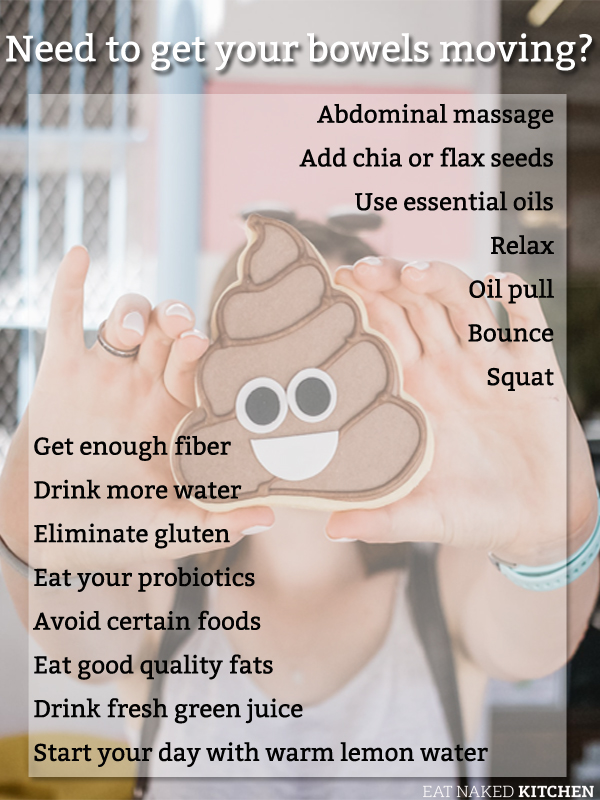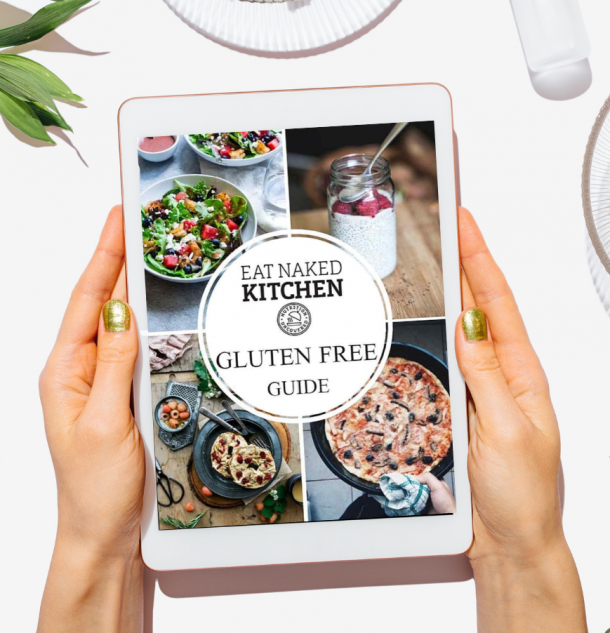While the medical definition of constipation is fewer than 3 bowel movements per week, functionally you’re considered constipated if you go a full day without a bowel movement. While this is considered “normal” by our medical establishment, it’s far from optimal. You want to be moving your bowels without effort 1 to 3 times a day. If that’s not happening, or if you have to do a wild song and dance to have things “go” (a big cup of coffee, a high dose of magnesium, an epic bathroom session and so on), then there’s something wrong.
From a health perspective constipation is more than just an uncomfortable annoyance. It’s actually quite serious and can be the precursor to a whole host of subsequent problems from diverticulitis to parasites. Your digestion is a carefully orchestrated series of events designed for your body to break down and assimilate the nutrients from your food, and then discard any waste matter. When this waste matter sits and collects rather than moves through, your body will slowly reabsorb a lot of the toxic matter – this is called “endotoxicity”, or toxicity from within. This will have serious consequences to your health if it continues over the long term.
The good news is that more often than not you can take matters into your own hands and resolve constipation yourself.
Here are 15 things you can try to get your bowels moving.
1) Drink more water.
This is perhaps the easiest and most obvious thing to try. Constipation is a classic sign of dehydration.
Unsure if you’re drinking enough? Here’s a good starting point: drink 1oz of water for every 2lbs of body weight. This means if you weigh 150lbs, you should be drinking 75oz of water a day. Add more for every diuretic beverage you drink (anything caffeinated, alcoholic, or sweet) and for heavy exercise. I like to add a pinch of unrefined sea salt into the water for an easy source of added electrolytes.
2) Eat good quality fats.
This one comes as a surprise to many folks, but it’s a really important and often overlooked aspect of our digestion. Here’s why: when you eat fat, your gallbladder squirts bile into the duodenum, top of your small intestine, where it breaks down the fats you ate and escorts toxins out of your body. Bile stimulates peristalsis – the gentle muscular contractions responsible for moving food through your digestive tract. Without fat, your body doesn’t secrete enough bile, which slows this whole process down. So eat your fats!
3) Make sure you’re getting enough fiber.
Fiber is a bulking agent and for some, this can be critical for healthy bowel movements. It also acts as a prebiotic – feeding the beneficial bacteria, or probiotics, in your gut. All of this is essential to healthy bowel movements.
Now, I’m not talking about eating a bowl of All Bran for breakfast or even necessarily taking a fiber supplement. Ideally you’ll get your fiber from the whole foods in your diet – preferably vegetables, not grains (which can for some, counter-intuitively, be very constipating). Strive for 75% of your meal to be veggies and you’ll have lots of fiber naturally!
4) Eliminate gluten.
One of the most constipating foods I’ve ever encountered is gluten. For many people, it is what it sounds like: “glue.” For this and many other reasons you can read about here, I recommend eliminating it.
5) Oil pull.
This ancient Ayurvedic cleansing technique has always worked wonders for me. Here’s how you do it: first thing in the morning before drinking or eating anything and before brushing your teeth, put a spoonful of oil in your mouth (I like to use coconut oil, but any good quality oil will do) and swish it around for 20-30 minutes. Toxins and bacteria are attracted to the oil, and you will “pull” them out of the deep crevasses between teeth and gums that you simply can’t access with your toothbrush or dental floss. DO NOT SWALLOW. Spit the oil into the garbage (not the sink or you’ll clog it!) and then brush your teeth. You’ll have a beautifully clean mouth and the mild detoxifying effect of the oil pulling stimulates your bowels.
6) Bounce.
Exercises that involve bouncing stimulate the bowels, as any runner will attest, (aka “Runner’s Trots”). Bouncing stimulates the bowels because it stimulates your lymphatic system as well as well as simply gets things moving physically. So: jump rope, do some jumping jacks, hit your kid’s trampoline, grab a pogo stick, or just go for a run!
7) Drink some fresh green juice.
I love my home-juiced green juice for lots of reasons, but this is one of my favorites. Green juices are mildly detoxifying, which will stimulate your bile flow. Want to pack an even bigger punch? Include beet greens in the mix.
8) Squat.
Most cultures around the world squat when they move their bowels rather than sit on a toilet. This isn’t just due to a lack of modern bathroom equipment, it’s actually structurally much more conducive for your bowels to eliminate. Don’t worry, you don’t have to give up your beloved toilet to achieve this posture. Check out the squatty potty – we have one and have never looked back.
9) Relax.
This one’s easier said than done for certain personalities and schedules, but it’s really important nonetheless. Your digestion is a parasympathetic process. This means that your body needs to be in a relaxed state, not a stress state, for it to function properly. When it’s time to move your bowels, make sure you’ve got enough time to give your body the space to do what it needs. Take a few deep breaths to shift into a parasympathetic mode and trust that your body can and will do what needs to be done. I’ve had clients who have consistent BMs only when they do their morning meditation because it so effectively shifts them into parasympathetic mode. Bonus – use Parasympathetic essential oil blend specifically designed to aid the body into a parasympathetic mode by applying it to the mastoid bone behind your ear, which stimulates the vagus nerve.
10) Eat your probiotics.
Constipation is often a sign of deficient gut flora, those beneficial bacteria that keep our intestines functioning optimally. Make sure you’re getting lots of probiotics in your diet – cultured veggies, kombucha, water kefir, and beet kvass are especially helpful. You can also supplement with a quality probiotic supplement. Here is my favorite.
11) Avoid constipating foods.
We already talked about eliminating gluten from your diet, but there are other foods that can be constipating for some people. Any kind of processed or refined foods are the most likely culprits, after which are dairy, grains, bananas, and potatoes.
12) Add chia or flax seeds to your diet.
Both chia and flax seeds are very fibrous and good sources of essential fatty acids, which means they stimulate bile production. We keep a jar of them in some water in the fridge and add them to smoothies. Remember to drink lots of water with them!
Another way we use these seeds is as a DIY fiber supplement. Simply grind equal parts of chia and flax seeds, store them in a glass jar in the freezer, and take 1 tablespoon of them in water before bed.
13) Give yourself an abdominal massage.
You can coax your bowels to move by giving yourself a gentle abdominal massage. Start in the lower right-hand side of your belly, just on the inside of your right hip bone where your colon starts, and gently move upwards toward the bottom of your right rib cage. Then move across your belly to the left just under the rib cage, and then down the left side to the inside of your hip bone. It is very important that you ONLY go in this direction. I have seen clients get extremely constipated when massaged in the other direction.
14) Use essential oils.
Ginger, fennel, tarragon, anise seed, and peppermint essential oils can all be very helpful with constipation. I use an oil blend by Vibrant Blue Oils called Digest, which includes all of the above plus juniper berry (which supports detoxification). I like to put a couple of drops in my hands and inhale deeply. In addition to Digest, I also recommend Gallbadder (supports nausea) and Parasympathetic (supports relaxation necessary for digestion) essential oil blends from Vibrant Blue Oils.
15) Start your day with warm lemon water.
Another easy strategy that can get bowels moving naturally is to start your day with warm lemon water. Warm liquids, especially when consumed first thing in the morning, stimulate the digestive process.
Still can’t get things moving?
If you’ve tried all of the above and you still can’t get things moving, then you need to do some further clinical investigation to identify the underlying problem. If this is the case, I strongly recommend contacting a practitioner for some additional support, as it could be a sign of undiagnosed food sensitivities, sluggish bile, liver congestion, hormonal imbalance, a sluggish thyroid, a deficiency in pancreatic enzymes and/or hydrochloric acid, or gut dysbiosis.





Hi Margaret,
You have given some great tips here to cure constipation. Squatting, drinking plenty of water and drinking a glass of warm lemon water have always worked for me personally. 🙂
One more very effective remedy that works wonders (for me at least) is drinking a cup of hot coffee after getting up in the morning, it gets the job done within 30 minutes of its intake. However, I avoid this because I avoid caffeine.
Regards,
Anirudh Bahadur
P.S. Great article Margaret. 🙂 🙂
Anirudh,
Great tips with warm lemon water in particular. That’s a good one.
I specifically didn’t mention the coffee because yes, it works, but it’s really hard on the digestive system and your adrenals, so it’s not the best option (but yes, it is effective in emergencies! 🙂 )
Another great tip is first thing in morning before eating breakfast … 1 or 2 tsp. of apple cider vinegar in glass of water…. even better than squeezed lemon for constipation and losing weight. I do the lemon too but apple cider works more efficiently.
Will apple cider vinegar pills work as good as the liquid?
We don’t have any personal experience using the pills. Most of the research done on ACV is with the liquid. That said, in concept, they should….but I would drink a glass of water with each pill to ensure you’re well hydrated.